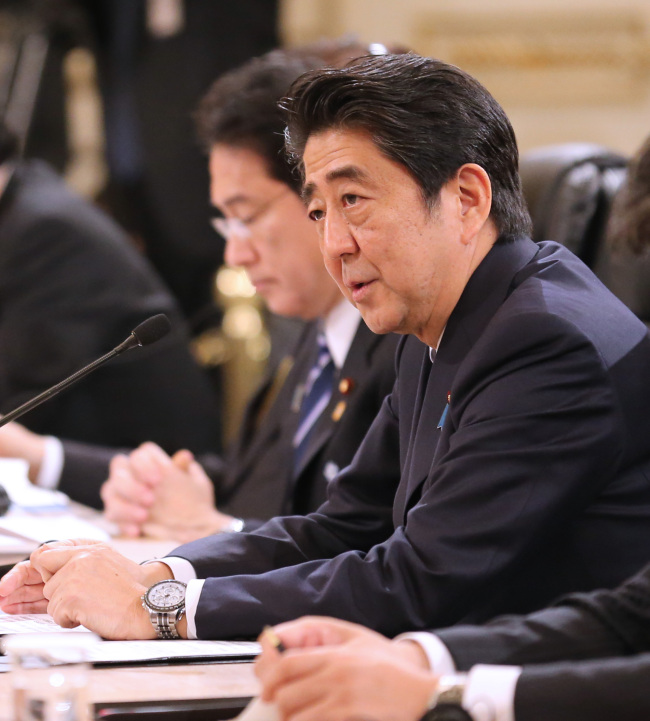After years of bitter ties between Seoul and Tokyo, Japanese Prime Minister Shinzo Abe arrived at Seongnam Airbase, Gyeonggi Province, Sunday, for a trilateral meeting and his first-ever talk with President Park Geun-hye on Monday.
Though previous leaders of the two countries have held summits at least once a year ― visiting each other quite on a regular basis ― Monday’s summit is the first of its kind since May 2012, when Park’s predecessor Lee Myung-bak sat down with the then Japanese Premier Yoshihiko Noda, before Abe resumed office later that year.
Though previous leaders of the two countries have held summits at least once a year ― visiting each other quite on a regular basis ― Monday’s summit is the first of its kind since May 2012, when Park’s predecessor Lee Myung-bak sat down with the then Japanese Premier Yoshihiko Noda, before Abe resumed office later that year.

For Abe, it is the first visit to South Korea in nine years, having last come to meet South Korean President Roh Moo-hyun 2006, during his first stint as prime minister.
The first summit in three years and five months brings some level hope that the two might mend ties, but also reflects how long the two countries have remained at odds over historical and territorial issues.
The relations between the allies had soured over the past few years, due to disputes over Japan’s wartime atrocities and its claim over Korea’s easternmost islets of Dokdo.
Despite the summit on Monday, the two countries face a tough road ahead with their apparent failure to see eye to eye on key thorny issues including the wartime sex slavery by Japan during World War II.
The obvious rift between Park and Abe makes prospects of a breakthrough bleak.
Park on Friday expressed hope that the two countries could resolve the issue of South Korean women who were sexually enslaved by Japan during wartime ― also referred to as “comfort women” ― by urging Tokyo to take “sincere measures” for the victims in an interview with the Japanese press.
But Japan has insisted that all compensation related to the country’s colonization of the peninsula have been settled with a bilateral treaty with Korea in 1965, a position by which Abe stands.
Later in the day, Abe’s deputy chief cabinet secretary Koichi Hagiuda reiterated that the country’s stance on comfort women has not changed.
Experts say that Abe’s relatively short two-day trip and 30-minute talks with Park ― which will not include a luncheon ― is indicative of the icy relationship between the two countries.
Yang Ki-ho, a professor of Japanese studies and Japanese politics at Sungkonghoe University, told local media that there was little possibility that the two countries will see progress on the issue.
“Japan has consistently demanded not to include the (comfort women) issue in the agenda. ... The two countries will continue to mediate up until the summit is held, but it is hard to expect the two parties to reach a specific conclusion,” he said. “The Abe administration is very strict when it comes to the issue of comfort women.”
With the two leaders gearing up for a summit, the foreign ministers of Korea and Japan met Sunday morning, and agreed that meeting should be “a good starting point for Korea-Japan relations.”
According to the Foreign Ministry, the ministers had a “comprehensive discussion” about the items in the agenda, although it denied to elaborate on the specifics.
As Abe’s visit come amid historic and territorial dispute between the two countries, protests by local civic groups against the talks erupted across Korea.
The Korean Council for the Women Drafted for Military Sexual Slavery by Japan held a demonstration in front of Japanese Embassy in Jongno-gu, central Seoul and demanded Japan apologize for its wartime atrocities.
Lee Yong-su, one of the surviving comfort women, urged Abe “not to come at all” if he has no intention of resolving the comfort women issue.
Civic groups protesting Japan’s Dokdo claims also held demonstrations, decrying Tokyo for its comments related to collective self-defense.
Korea and Japan recently divulged their differences in Japan’s overseas operations, particularly in North Korea.
By Yoon Min-sik (minsikyoon@heraldcorp.com)









![[Hello India] Hyundai Motor vows to boost 'clean mobility' in India](http://res.heraldm.com/phpwas/restmb_idxmake.php?idx=644&simg=/content/image/2024/04/25/20240425050672_0.jpg&u=)









